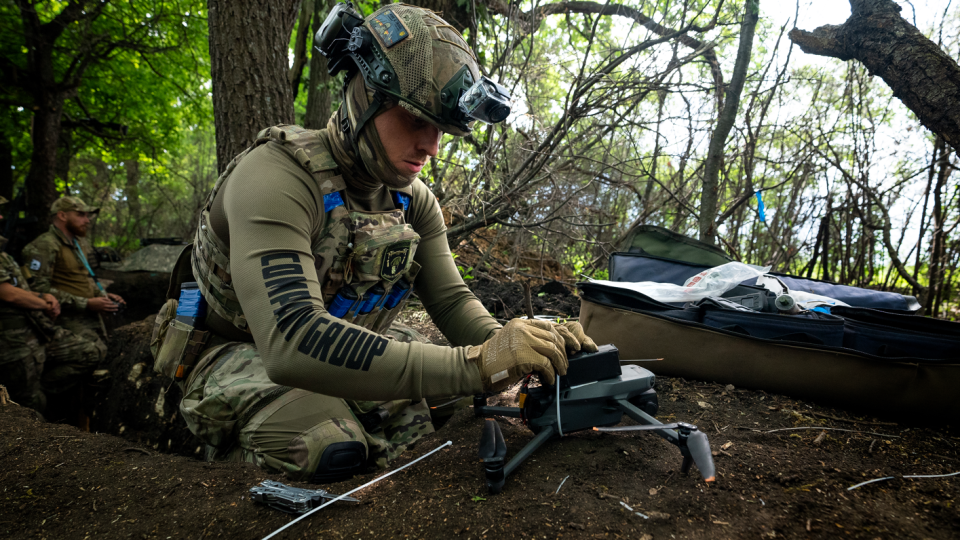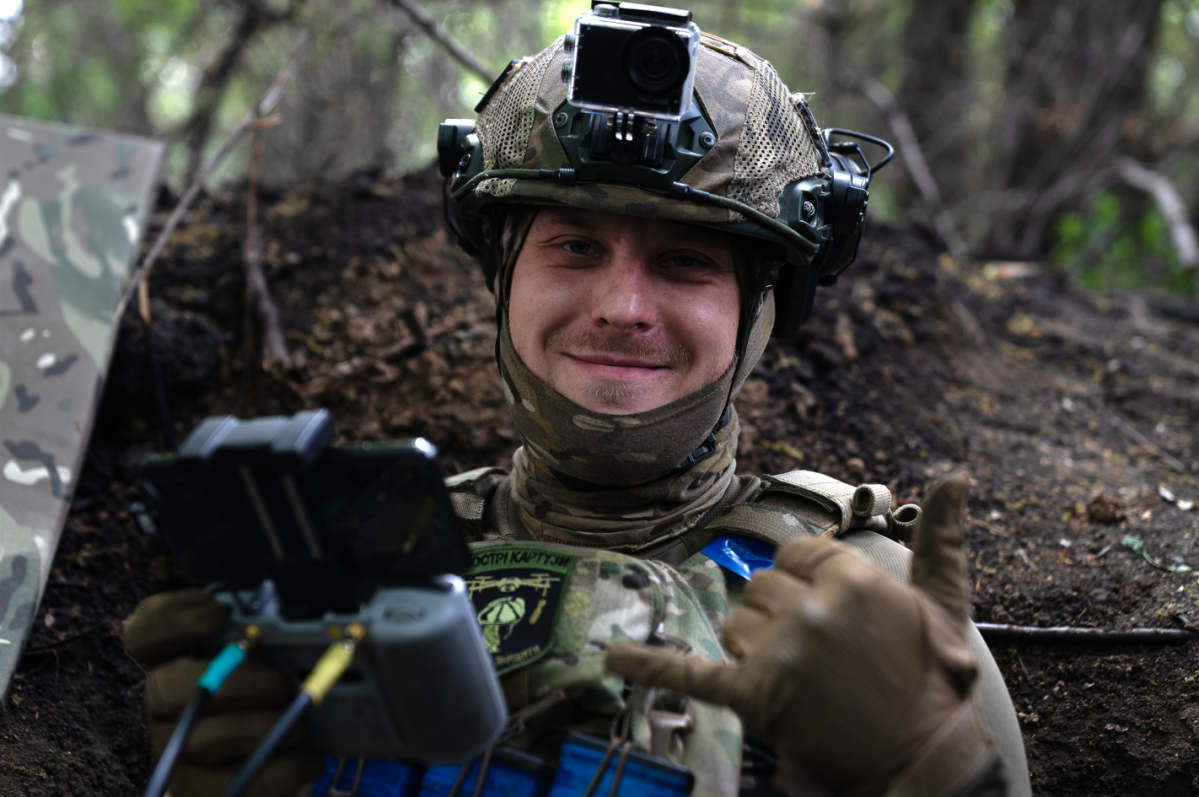In the village of Lyptsi, Ukrainian troops appear to have weakened the Russian surprise offensive.
A few weeks ago they quickly advanced towards Kharkov. But with the help of reinforcements, Ukraine is slowly turning the tide.
However, the threat from the north has not disappeared. Lyptsi is still a target.
There is the heavy sound of grenades landing nearby as we drive at high speed through the destroyed and deserted streets with an elite Ukrainian unit.
Two of the team point shotguns out the window. They scan the sky for kamikaze drones. They have become one of the most powerful weapons of this war.
This Ukrainian unit is about to use them too. They call themselves the Peaky Blinders, after the cult TV series.
Oleksandr, their leader, says that when the war broke out they came to guard their streets with hunting rifles, dressed in civilian clothes. He says it looked like a scene from the hit show.
But they are no longer a team of volunteers. They are now battle hardened and trained by Western special forces. It’s now the high-tech Peaky Blinders, using cheap, mass-produced small drones.
Nevertheless, they have kept the name and wear camouflage flat caps with their motto embroidered on the back: “To Find and Destroy”.

In recent weeks, Oleksandr has literally fought for his home.
He worked the fields near their dig – hidden in a tree line. Before the war he grew strawberries here. But now he’s planting bombs.
Since the offensive began, the Peaky Blinders team says they have killed or wounded more than a hundred Russian soldiers.
They operate like a small air force with dozens of drones and an arsenal of bombs – one to take out tanks, others to target groups of infantry or individual soldiers.
They drop the bombs or use kamikaze drones that fly directly to a target. They are also called First Person View or FPV drones.


On the day we visit, they have difficulty finding new targets.
It’s proof that they’re having some success. The Russians are in hiding.
To fill the time, they use one of their larger drones to disarm troops they have already killed. Equipped with a grappling hook, they eventually manage to grab an assault rifle next to a dead Russian soldier.
They not only kill, but also take weapons.
Drones have transformed this war to a point.
But Anton, Oleksandr’s older brother, knows that they are not enough to defeat the Russians.
“We can stop them with drones and hurt them,” he says, “but unfortunately not to win with them.”
He says longer-range weapons aimed at the build-up of Russian forces across the border “could have prevented this offensive.”


The Russians, like them, have also devised ways to disrupt their signals using electronic warfare.
When the Peaky Blinders finally find a new target, their signal is jammed before they can kill. They can lose four or five drones in a day.
Despite the setbacks, Oleksandr says the Kharkov offensive has given his weary men a second wind. They used to worry that the world would lose interest. But he knows this is still a danger with no end in sight.
He says he expects the conflict to last a very long time, “perhaps several years or even decades.” Neither side, he says, has the strength to deliver a knockout blow. To push the Russians back to their border, he says Ukraine will need “colossal” Western support.


But for now, this latest Russian offensive is being thwarted.
Oleh Syniehubov – head of the Kharkov military administration – believes the original plan was to go all the way to the city of Kharkov. He told the BBC that recently captured Russian soldiers had revealed that their goal was to take the city of Vovchansk in two days and reach the city of Kharkov in five days.
President Putin has denied that taking the city was part of his plan.
Governor Syniehubov believes that the Russians could eventually be pushed back to the border – just like in 2022. But he adds: “Liberating the area is only half the battle. The other half is to preserve it.”
The new Russian offensive in the Kharkov region has once again raised questions about whether Ukraine can really win this war.
It has certainly exposed shortcomings in Western support, as well as tensions within Ukraine’s own tired armed forces – which are overstretched, outgunned and outnumbered.
Even if Ukraine manages to weather this latest storm, the country will still lose ground across the 1,300 kilometer front. Ukraine has also failed to match Russia’s revamped war machine – with its recruitment of new troops and its ability to rearm itself.
‘The West fears Russia’
Ukraine believes that much of the blame lies with the determination of its allies.
This week, President Volodymyr Zelensky expressed his frustrations about the limits of Western support. He accused his allies of being “afraid that Russia would lose the war,” and only wanting Ukraine “to win so that Russia doesn’t lose.”
Ukraine points to the recent slowdown in US military support. Lieutenant General Ihor Romanenko, former deputy chief of the Ukrainian General Staff, told the BBC that the US had “organized a six-month period of opportunity for the Russians.”
Oleksandr Merezhko, chairman of Ukraine’s parliamentary foreign affairs committee, said such delays also reveal divisions in Western foreign policy.
“It seems to me that some have already agreed to the division of Ukraine.”
He said the West appears to be pursuing a policy of avoiding a total defeat for Ukraine without getting into direct conflict with Russia – “if you pursue both goals it robs you of resolve,” he said.
Lieutenant General Romanenko puts it more bluntly. “The West is afraid of Russia,” he said. “This must be overcome.”


A senior Ukrainian defense official told the BBC that the latest US military aid package will only be enough to continue defensive operations until the end of this year.
In other words, not enough to launch a more expensive and difficult offensive in an attempt to regain territory.
Oleksandr Merezhko said the recent US military aid package “only gives us a better chance to survive and maintain the front line.” What Ukraine needed, he said, was a commitment to long-term and continued support.
The lack of weapons has been exacerbated by hesitations about what the West is willing to supply.
Lieutenant General Romanenko says the Ukrainian air force should already have been reinforced by F-16 jets. He calls the delay ‘cowardice’.
Similar frustrations exist over the use of Western-supplied long-range weapons. The US does not want them fired on Russian soil. Mr Merezkho says: “If we limit ourselves to using it only on our own territory, we will simply bleed.”
He believes that the direction of the war will only change when Russia feels the consequences of the war at home.
Back on the front lines, Anton says Ukraine had observed the build-up of Russian forces across the border. He says that if they had been targeted early, “we could have prevented this offensive.”
How will it end?
There is also a growing realization within Ukraine that it may not win this war through military means alone.
Ukrainian MP Oleksandr Merezhko admits it is taking a huge toll.
“We know we are bleeding, that half of our electricity grid has been destroyed and a third of the economy. We are losing people and we have no guarantee that in a year’s time we will have the weapons we need.”
Merezkho does not believe that peace talks with Putin can ever take place. But he no longer rules out talks about a ceasefire.
He will not accept the division of Ukraine, but admits that getting back the occupied territories could now be a long process. He describes his country as ‘tired and angry, but not defeatist’.
Lieutenant General Romenenko also believes that regaining Ukraine’s lost lands will be gradual and will require both military and diplomatic work.
Ukraine is not ready to give up this war. But there is a growing realization that at some point other ways of ending it may need to be considered.
However, Ukraine’s resistance and willingness to fight have not been extinguished – even with the latest setbacks. The country did not suffer a fatal blow in Kharkov. In fact, it shows once again that it can defy the odds, even at its weakest.







